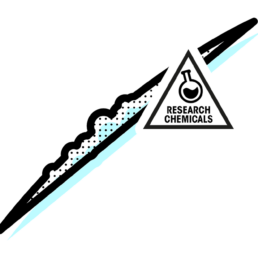MDPV causes a feeling of elation, even euphoria, with great self-confidence and a feeling of physical strength without hunger or tiredness. Users also report increased sexual arousal, great talkativeness and a subjective feeling of improved concentration and creativity.
The effect of MDPV occurs after about 5-20 minutes when consumed nasally and after 15-30 minutes when consumed orally. Reports on the duration of effect vary widely: depending on the type of consumption (MDPV consumed orally has a longer effect) and dose, the effect lasts between 2 and 7 hours. However, many users report that redosing - especially several times - prolongs the effect disproportionately. In this case, after-effects can still be felt up to 48 hours after consumption.
MDPV is effective even at very low doses. An overdose can therefore happen relatively easily and can trigger panic attacks and feelings of persecution in addition to a sharp increase in blood pressure and heart rate (cardiac arrhythmia has also been reported). Some users perceived this condition as life-threatening.
At normal doses, adverse effects such as nausea, headaches, overheating with profuse sweating, tension in the (jaw) muscles, loss of appetite, confusion, nervousness, restlessness and anxiety may occur. The likelihood of adverse effects increases with the dose.
Most users report a strong urge to redose as soon as the effect of the first dose wears off; the actual "comedown" from MDPV is often described as extremely unpleasant to unbearable (depression, paranoia, feelings of guilt, agonising insomnia). This leads to a loss of control for some users: phases of days of MDPV consumption without sleep and sufficient food can lead to hallucinations and psychotic states.
MDPV is one of the so-called research chemicals, which is why there is little scientific knowledge about its mechanism of action. MDPV presumably inhibits the reuptake of dopamine and noradrenaline into the nerve cells. As a result, the downstream nerve cells are constantly stimulated by these two messenger substances. An increase in the concentration of dopamine acts on the so-called reward system in the brain, while an increase in the concentration of noradrenaline generally causes a so-called "fight or flight" reaction: the body and mind are stimulated as if the organism had to survive an acutely dangerous situation.
MDPV is a research chemical and there are currently no scientific findings on the long-term effects of its use. However, a high psychological dependency potential can be assumed.
- Cardiovascular problems
- Psychological problems, restlessness or anxiety
- Liver or kidney damage
- Pregnancy
- Epilepsy
If you consume MDPV despite the associated health hazards and risks, you should observe the following rules in addition to the general information on risk reduction:
- MDPV is very potent. Therefore, always start with a minimal amount to avoid overdosing. Use a scale.
- Take the opportunity to have the substance analysed.
- Avoid redosing. With MDPV, redosing can cause a potentially undesirably long duration of action; particularly negative (after)effects can be intensified and prolonged.
- Never consume MDPV to make the hangover more bearable. The hangover will only get worse and last longer.
- Take breaks from consumption to avoid psychological dependence.
- Do not combine MDPV with other substances or medications, especially not with other stimulants (including caffeine).
- Make sure you eat enough (light meals, fruit) and drink enough (but no more than 0.5 litres per hour).
- Take rest/cool-down breaks.
- If you consume MDPV nasally, do not use banknotes and do not share your tube with others. There is a risk of infection (herpes, hepatitis C, HIV).
- Pay attention to safe sex even under the influence of MDPV.
MDPV is a fully synthetic amphetamine derivative that has been available as a research chemical since around 2005. It appeared as an ingredient in so-called "bath salts" and was also advertised as "synthetic cocaine". Chemically, it is closely related to pyrovalerone, which was developed in the 1960s as a medical psychostimulant but was soon withdrawn from the market due to its potential for abuse and addiction. In terms of its chemical structure, MDPV is similar to MDMA, but its effects are more similar to those of amphetamine, methylphenidate ("Ritalin") or cocaine. Information on dosage and effects is based on user reports. MDPV is usually consumed nasally or orally. The effect and duration of the effects are influenced by the form of consumption. MDPV is very potent: usual doses range from 3 mg (mild effect) - 15 mg (strong effect).
MDPV has been included in the Narcotic Substances Act since June 2019. The acquisition, possession, import and export, transfer to and procurement for others (transfer and sale) are punishable by law. Consumers who violate the SMG must expect a mandatory visit to a public health officer (in Vienna: the outpatient centre of the Addiction and Drug Coordination). There, health-related measures may be ordered and a drug test may be expected. If you adhere to these requirements, there will be no court proceedings.
Status: 2019

